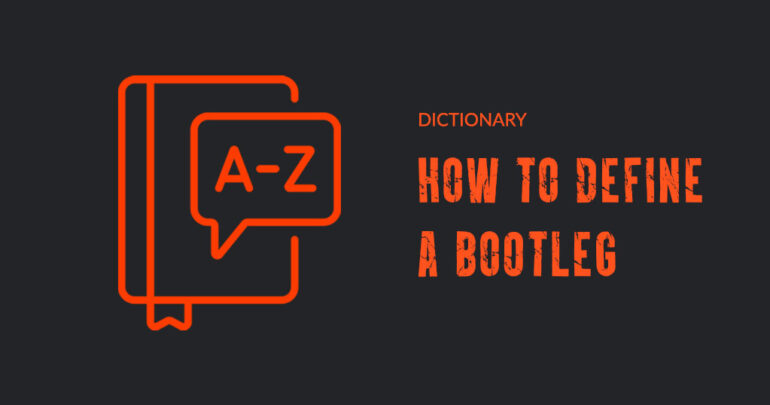In many record stores around the world you can find vinyl bootlegs on the shelves. There are also plenty of illegal vinyl bootlegs being offered on online platforms like eBay. But what exactly is a bootleg? And how can you recognize one as a buyer?
Vinyl Bootlegs – Definition and Identification
Counterfeit pressings on vinyl – a definition
A bootleg is, in short, an unauthorized audio recording that has not been licensed by the rights holder. Originally, the term referred to live recordings of concerts that were released without the consent of the performer and/or the label. Nowadays, the term is often used for unauthorized reissues of albums on vinyl. Strictly speaking, using the term „bootleg“ in this context is not entirely accurate. These unauthorized reissues are actually counterfeits or simply fake copies. Although the term „counterfeit“ is technically correct, it is less commonly used.
Which vinyl records are available as a bootleg?
Well, to be honest any album on vinyl can be released as a counterfeit pressing. Bootlegs predominantly focus on well-known classics, as there is immense demand for albums like Pink Floyd’s „Dark Side Of The Moon“ or The Beatles‘ „Sgt Pepper’s.“ From my experience of working in a record store, I am aware that many buyers don’t know what a bootleg is or that such counterfeit records even exist. Consequently, there is significant potential for revenue in these illegal pressings.
Albums that have not been pressed on vinyl for a long time and are often being offered on platforms like Discogs for triple-digit prices are also reissued as bootlegs. In such cases people often opt for the cheaper bootleg version in order to add the record to their collection.
Recently, bootlegs of current albums that have not (yet) been officially released on vinyl have emerged. Examples include albums by Frank Ocean or the latest album „Fear Inoculum“ by Tool. There are more than a dozen unofficial pressings available on colored vinyl. It was only after more than two years following its initial release that the album finally came out in an official pressing as a 5LP vinyl box set.
Is it legal to sell vinyl bootlegs?
In short, no. Selling vinyl bootlegs is a copyright infringement. Nonetheless, it is rare to find a record store without bootlegs in their shelves, not only in the second-hand section. However, they are not typically found in online shops to avoid legal repercussions. Bands like Pink Floyd aggressively pursue any sellers of bootleg vinyl releases, even on platforms like eBay, which can result in costly consequences. Discogs has also taken strict measures to exclude bootlegs from their marketplace. Collectors can still add bootlegs to their personal record collections, but they are not allowed to offer them for sale.
How do I recognize a vinyl bootleg?
Unfortunately, there is no universally applicable answer to this question. However, here’s what can be said: When it comes to online purchases, identifying a bootleg is nearly impossible. One criterion that may be helpful is the price. If „Dark Side Of The Moon“ is offered as a new pressing for around 15 euros, you should be skeptical. Otherwise, it is challenging to identify a bootleg when purchasing from an online seller.
In a physical record store, the situation is somewhat different. In addition to the price, which is typically significantly cheaper than official reissues (especially considering the recent price development of vinyl records), there are a few other indicators to consider:
- The album cover: The print quality of the cover is often inferior. The colors may be blurry or the shapes pixelated because the cover was either available as a small file format or even scanned.
- Matrix numbers: Every record has a matrix number engraved into the run-out groove of the vinyl. Originally intended for internal use by the pressing plant, these numbers sometimes provide valuable clues to collectors about the edition and pressing. Bootlegs often lack these matrix numbers, which is a clear indication of a counterfeit pressing, as seen with this Modern Lovers LP that ended up in my tote bag from a flea market.
- Sound quality: Although there have been a few exceptions in recent times, bootlegs generally exhibit poor sound quality because they don’t have access to the original vinyl master for pressing. CD versions or even MP3 files are often used as the source. This can result in subpar sound. Therefore, the tip is to listen to the vinyl directly in the record store if possible!
Bootlegs are becoming increasingly professional – be cautious when buying!
Despite the mentioned points, it is not always easy to recognize a bootleg, especially due to the growing professionalism of the manufacturers. Nowadays, there are many bootlegs that sound and look excellent, with only minor differences from an „original“ release. Even with over 6 years of experience working in a record store, for example, I purchased a bootleg version of Pearl Jam’s self-titled album just last year, which I only realized after returning home to Berlin. At least it sounds fantastic.
Ultimately, here’s a tip to keep in mind: if you have a bad feeling about it, it’s better to refrain from making a purchase. If you’re unsure whether you have a legitimate edition in your hands after acquiring and listening to the record at home, online platforms like Discogs or Popsike can provide valuable insights about the correct pressing. If it turns out to be a bootleg, the seller at the record store might be willing to discuss an exchange.


